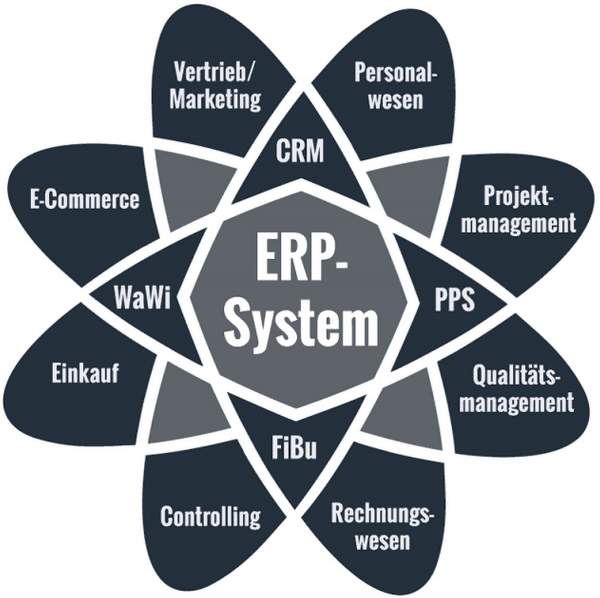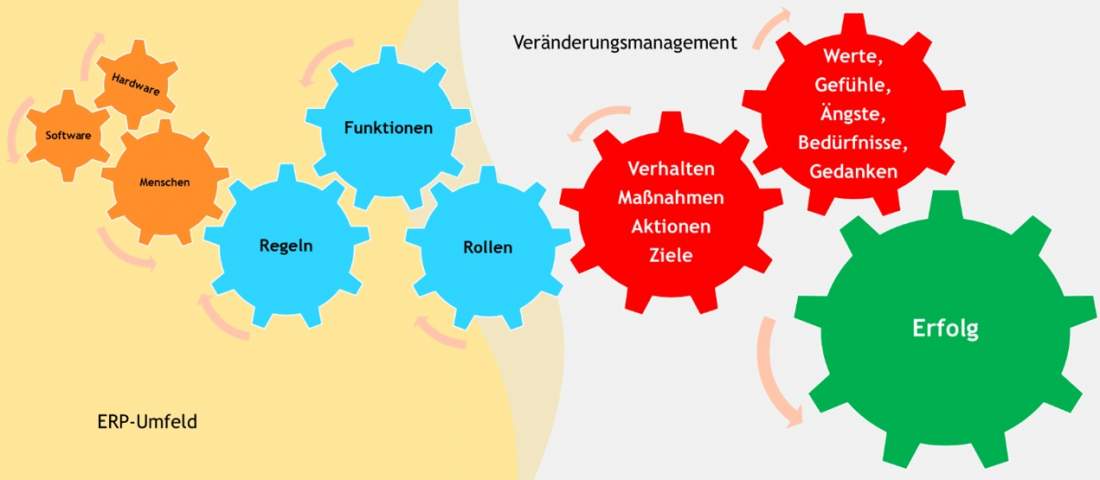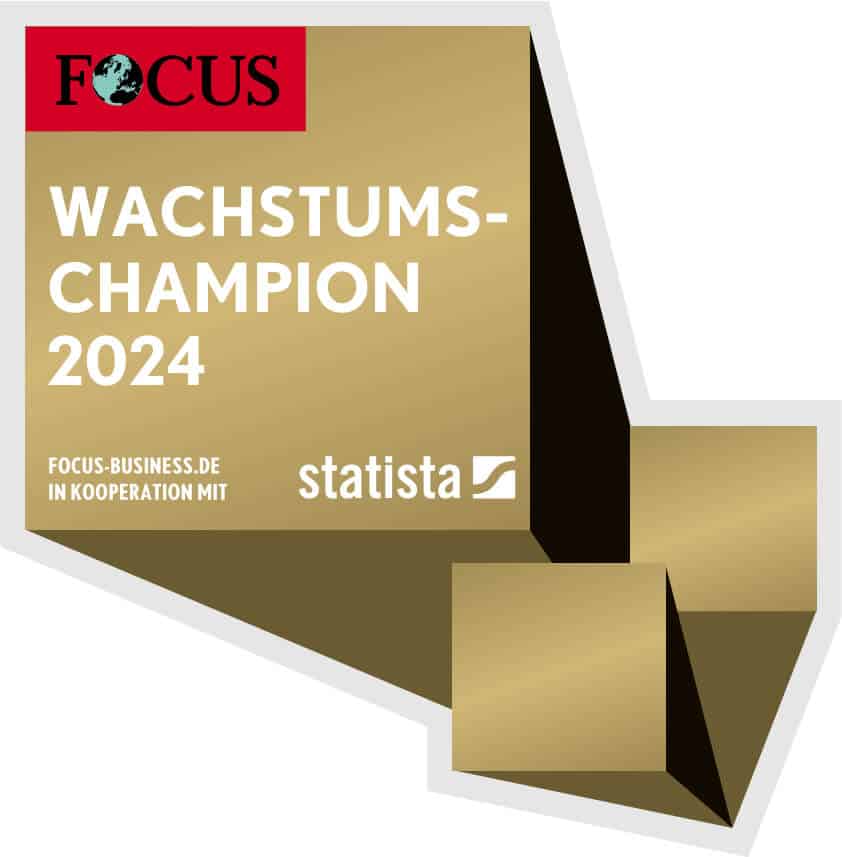What distinguishes ERP projects from prejudices about women and men? The many "stories" about ERP projects that have failed, gotten out of hand, been overpriced, missed deadlines and even failed are true. Google delivers 31,500 hits in 0.52 seconds for the question: "Why ERP projects fail". Studies by experts come to the conclusion that, on average, every second project has problems, some of which are considerable. In the author's opinion and experience, the main reason for this is that ERP implementations are still primarily seen and treated as IT projects. However, these are highly complex and sensitive change projects. It is time to look at ERP projects differently.
The ERP system as a central control system
ERP systems have a high degree of strongly integrating approach have a significant influence on the What? How? Who? and sometimes Why? in the daily processes and interactions within the company. This means that a not insignificant part of the operational management system is de facto determined "by the system", so to speak. Standards, routines, repeatable and measurable processes replace individual assessments, values and behavior. So far, the objective is clear and intentional. Irrespective of the question as to whether this is also the case in all areas of the company and all issues. actually serves the corporate objectiveThe aim here is to shed light on what it means under these conditions when this centralized, integrative system is newly introduced, significantly expanded or changed. Such a change affects every role, every function, every rule and ultimately every single employee in the company. As much as the integrative character of the ERP system may seem positive and necessary on the one hand, a change or redefinition of this system also means a high, often underestimated risk for the previously "well-established" relationship between all elements.
ERP projects are not IT projects

Just looking at the definition of an ERP system (Enterprise Resource Planning) is enough to realize the importance and scope of this system for the existence and functioning of the company. All functions, all departments, all hierarchies and, above all, all employees and their behavior are directly affected by it. The ERP project therefore has the enormous task of reflecting the company's purpose and uniqueness as perfectly as possible.
How can you tell that the project is suffering?
Of course, there are a whole series of signs and measuring points that can be used to recognize that the project is not running "smoothly" as desired and planned: Deadlines are not being met, budgets are being exceeded, the number of requests is increasing, go-live dates are being postponed, et cetera et cetera. But let's take a closer look at the details of ERP implementations.
The symptoms
Much more frequent and dangerous than the obvious signs are the many, small and inconspicuous missteps, mistakes, uncleanliness, "bent" actions, refusals, failures, and so on. Who doesn't know this?
- Improperly posted inventory transactions
- Lack of understanding of the different stock categories
- Ignorance or partial knowledge of the disposition procedures
- Different types of inventory management
- Incomplete or incorrectly recorded orders
- Poorly or not maintained data records (e.g. price or customer data)
- Unprocessed credit notes and/or complaints
- Timely recording of booking data
- ... and much more.
The list can be extended indefinitely and is only given here as an example to help you understand the mistakes.
The effects
What do all these "small" mistakes have in common? They usually go unnoticed and are not even noticed at first. The fatal thing is that their negative effects often only come to light much later, but then all the more severely. The consequences are often:
- Dissatisfied customers
- Missing orders
- Complaints
- High or missing stocks
- Lack of cash flow
- Cost increases and declines in earnings.
Here too, the list of example sequences can be extended almost indefinitely.
The causes
Employees make a significant and distinctive contribution to the interplay of operational factors. If this contribution is no longer sufficient in the context of the change in the system, or if it becomes faulty or incomplete, then this is the result of the individual not being sufficiently integrated into the change process. This usually leads to uncertainty, lack of understanding, demotivation, fear, feelings of inferiority and much more. The results of this can take on all facets, from failure to refusal to perform.
How do ERP consultants and change managers interact during ERP implementations?
First of all, it is important to note that both are not only justified, but that their respective responsibilities make a significant contribution to the success of ERP implementations. In our view, however, it is important that both functions are filled on the one hand and that tasks and responsibilities are clearly defined on the other.
Understanding the business model
First of all, it is necessary for all those involved to have a common understanding of the company's purpose, identity and vision at a meta-level. This is where the company's top management comes in. In the next step, both consultants/managers need to understand the business model, how it works and how it is implemented, Understanding rules and "culture". It is advisable to describe and document this understanding. The same applies to feedback from management, which validates this understanding. At first, this may seem somewhat complicated and incomprehensible, but in the subsequent steps it proves to be a fundamental basis and a "fallback position" if progress is at risk.
The ERP consultant
It is his task to adequately describe the core processes (i.e. roles and functions) required to map the business model in advance. It is important to use the correct (company-specific) language. The roles and functions must then be compared with the system definitions. In the event of deviations, it must be checked together with the company whether these deviations are disruptive and whether and how they can be rectified. This then involves very far-reaching decisions on necessary or desired adjustments.
The change manager
The responsibility of the change manager is to ensure that the implementation of the roles and functions and thus the functionality of the system in daily practice is known, understood and familiar to everyone and is practiced without problems. This task goes far beyond the communicative, cognitive and training aspects. It requires a deep understanding of all processes and aspects of change processes and human behavior. And above all, it requires extensive experience and a Very people-oriented management.
The content and responsibilities of both consultants/managers are not always absolutely clear-cut, but have many overlaps and similarities. One Good basic understanding and communication as well as permanent coordination are necessary.
The success model
The interactions required for successful ERP implementations can best be described as interlocking gears:

The perfect interaction between ERP consultant and change manager, supported by the company's decision-makers and project managers, integrated into the team and the culture of the Mandat company, increases the smart and smooth project flow and significantly increases the chances of success of the ERP project.
(Cover image: © contrastwerkstatt | fotolia.com)


